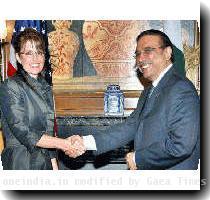US Embassy protests Pakistan police treatment of staff in latest diplomatic tension
By Nahal Toosi, APThursday, January 7, 2010
US says Pakistan harassing its diplomats
ISLAMABAD — The U.S. Embassy complained Thursday that its staff members are being harassed and detained as they travel around Pakistan, a rare public protest that illustrated the tensions between the allies as America expands its presence here.
The press statement issued Thursday reflects the rising frustration American officials feel over alleged Pakistani efforts to stymie Washington’s move to add hundreds more staff and more space to its embassy in Islamabad. It came as a contingent of U.S. lawmakers, including senators John McCain and Joseph Lieberman, arrived for a visit.
U.S. officials say they need more room and people to help disburse a $7.5 billion humanitarian aid package to Pakistan, whose cooperation Washington needs to fight al-Qaida-allied militants along the Pakistan-Afghan border.
But suspicion of U.S. motives abounds among Pakistanis: Many believe the U.S. is simply flooding the country with more spies whose ultimate aim is destabilizing Pakistan and taking over its nuclear program.
In recent weeks, American diplomats have faced lengthy delays in receiving approvals for visas and visa extensions. Some also have been stopped at checkpoints by police who have in a couple of cases temporarily confiscated their vehicles. Some of the incidents have been publicized in the Pakistani press.
On Wednesday, two Pakistani employees of a U.S. consulate and their police escort were detained while traveling in Baluchistan province in the country’s southwest to prepare for a visit involving a development project, an embassy statement said. It called upon Pakistani officials “to cease these contrived incidents involving U.S. mission vehicles and personnel.”
The statement also quoted U.S. Ambassador Anne Patterson as pushing Pakistan to implement an agreement to identify diplomatic vehicles in a safe manner.
The agreement lets those vehicles carry normal Pakistani license plates on the outside — so as not to be identified as U.S. vehicles and easily targeted by militants — while carrying special diplomatic plates inside to show police, embassy spokesman Rick Snelsire said.
“There was an agreement on that,” Snelsire said. “We’re waiting for the agreement to be implemented.”
The Pakistani Foreign Ministry’s spokesman could not immediately be reached for comment.
Snelsire said U.S. Embassy employees were still experiencing delays in visa approvals, despite appeals to Pakistani authorities.
“They don’t tend to reject visas; they just don’t issue them,” Snelsire said. “We’re still working on refining the process.”
Foreigners coming to work in Pakistan are often subject to background checks by multiple ministries and agencies, including Pakistan’s powerful intelligence apparatus.
The U.S. Embassy in Islamabad has plans to go from about 500 American employees to more than 800 over the next 18 months, largely to accommodate the aid package, which provides $1.5 billion annually over five years for economic and social programs.
The package is designed to strengthen Pakistan’s civilian government and comes as a string of violent militant attacks have rocked the country — apparent retaliation for its anti-Taliban army offensives.
The package’s requirements for accounting and oversight have rankled Pakistanis including top brass in the army, an institution that has ruled the country for about half its 62-year existence.
The visiting U.S. congressional delegation met with Pakistani President Asif Ali Zardari Thursday after a trip to Afghanistan.
While in Kabul, both McCain and Lieberman said U.S. missile strikes in Pakistan were critical to defeating terrorists in the region.
The attacks by the unmanned drones are a controversial element of U.S. strategy that have fed anti-Americanism in Pakistan. Publicly, the Pakistani government condemns them as violations of sovereignty, but analysts suspect it secretly aids the attacks.
Zardari told the visiting lawmakers that Pakistan should be given the drone technology itself, and urged that “U.S. actions should remain on the Afghan side of the border,” according to a statement from the president’s office.
He also pushed the U.S. to speed up its delivery of financial aid and to channel it through the Pakistani government, something some observers fear could feed graft.
Tags: Afghanistan, As-pakistan, Asia, Asif Ali Zardari, Central Asia, Embassies, Islamabad, North America, Pakistan, Passports And Visas, South Asia, United States

